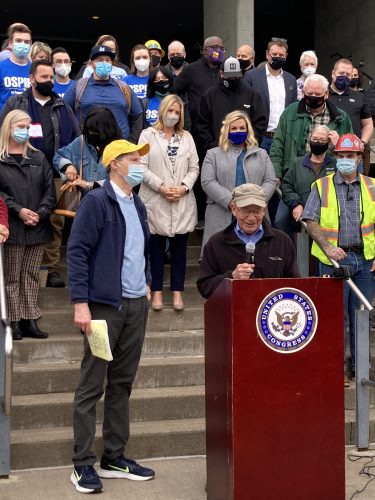
After months of negotiation and discussion, President Joe Biden’s infrastructure bill finally survived Congress and landed on his desk.
On Nov. 5, U.S. Rep. Peter DeFazio and Sen. Ron Wyden celebrated the legislative win, which just await’s Biden’s signature, with a press conference on the front steps of Eugene’s Wayne Morse Federal Courthouse Friday afternoon. The politicians were joined by dozens of supporters, from students at the University of Oregon to staff from the Eugene Airport, who stood behind the elected officials to celebrate the bill’s passage in the House Nov. 5.
Biden is set to sign the bipartisan Infrastructure Investment and Jobs Act bill into law on Monday, Nov. 15.
Considered a landmark bill by the Biden administration, it will invest in roads, bridges, water infrastructure, climate prevention, environmental justice, internet accessibility and more.
First introduced in the House of Representatives on June 4, the bill seeks to repair and build “roads and bridges with a focus on climate change mitigation, resilience, equity and safety for all users,” according to a Nov. 6 statement from the White House.
DeFazio and Wyden stood among the Lane County community members to speak about the latest legislation and what next steps are moving forward. DeFazio, who chairs the House Committee on Transportation and Infrastructure Committee, has been openly passionate about rebuilding infrastructure in the wake of climate change and says that the biggest provisions regarding climate change will be introduced in the Build Back Better bill.
“They left out my most major climate provisions,” DeFazio says. “The bill was written by 12 senators, and at least 11 of them are climate deniers. So that’s no big surprise.”
Wyden says that, to contribute to better climate infrastructure, he will push for incentivizing lower carbon emission rates through tax breaks.
“With the tax code, historically, somebody would show up and tax breaks would be given out like lollipops. I mean, to anybody who wanted one. That is all going to change,” Wyden says. “The more you’re reducing, the bigger your tax breaks.”
Other speakers at the conference included Lane County Commissioner Heather Buch, who said that when she looks at the bill, she sees how it will improve the lives of rural residents in Lane County. Residents in Blue River are still recovering from the Holiday Farm Fire in 2020 that scorched more than 173,000 acres up the McKenzie River.
“Wildfire and other natural disaster funding encompassed under the broad description of resiliency will allow us to pivot to conversations and projects that address prevention activities,” she said. “I would much rather we invest in protecting what we have than through the heartbreak of response and recovery.”
Bill Bradley, Local Amalgamated Transit Union (ATU) board executive member and Lane Transit District employee, said that Oregon will have $747 million for bolstering transportation infrastructure and that he’s looking forward to seeing more training programs for transit worker safety and pedestrian protection included in the bill.
Bradley said he has some concerns about transitioning in the industry; he appreciates how seriously DeFazio and Wyden have taken in addressing greenhouse gas emissions and climate change.
“I have a lot of workers that grew up in a diesel or in a carbon-based job,” he said. “We have to make sure that our mechanics are transitioned over to electric buses, and that they’re afforded the time, safety and equipment to be successful.”
DeFazio said that though this bill was a win for both parties, he isn’t finished advocating for some of his more important provisions.
“We went through a real legislative process two days in committee, on the floor, hundreds of amendments, including Republican amendments,” DeFazio said. “But we’re not done yet. The House must now pass the Build Back Better Act and send it to the Senate.”